

Bianca Wallin (born 1 October 1909 in Rome; died 5 January 2006 in Stockholm), was a Swedish artist.


Bianca Wallin (born 1 October 1909 in Rome; died 5 January 2006 in Stockholm), was a Swedish artist.
Bianca Wallin grew up in Stockholm, Sweden. She was the daughter of the Swedish artist David Wallin (1876–1957) and his wife Elin Wallin (1884–1969), Stockholm. Her father got a scholarship, so the family lived in Rome in Italy and in Paris in France for a couple of years and moved back to Stockholm in 1913. From that time on Stockholm became her home city. Her brother was the artist Sigurd Wallin (1916–1999) and her uncle was the artist Carl E. Wallin (1879–1968). Her education was influenced by her father's work as an artist and already as a child she learned how to draw. As a daughter in this artistic family Bianca Wallin also early showed her own artistic talents, and she early knew that she wanted to become an artist. In 1935 Bianca Wallin married Gábor Kornél Tolnai (1902–1982), a Hungarian Diploma Engineer from Budapest. They settled down in Bromma, a borough in the western part of Stockholm, and had three daughters, Eva (born 1939), Monika (born 1942) and Hillevi (born 1944).
After High School Exam in 1929 at Nya Elementarskolan for girls – Ahlströmska skolan at Kommendörsgatan 31 in Stockholm she wanted to become an artist. Bianca Wallin began to study for one year, in 1929–1930, at Edward Berggren and Gottfrid Larsson's Artist School in Stockholm to learn figure painting and drawing. The artist school was situated at Kungsgatan 28 in Stockholm. As teachers at the school Edward Berggren instructed in painting, Gottfrid Larsson in sculpture and Akke Kumlien in materials science.
After the year at the preparatory art school she studied for five years, 1930–1935, at the Swedish Royal Academy of Fine Arts in Stockholm, Sweden, and there she received a genuine art education. Among the teachers at the Academy of Fine Arts were such famous artists as Isaac Grünewald and Wilhelm Smith in figure drawing and Albert Engström in drawing. During the years 1932–1934, her teacher at the etching school was Emil Johansson-Thor, a painter and graphic artist.

"Travelling is a nice part of life", she said. Bianca Wallin liked to travel, because it gave her inspiration, change and a new ability to create. To get motives to paint she travelled a lot both in the north and south of Sweden, Scandinavia and other countries in Europe. She painted motifs from Germany, Hungary, France, the Netherlands, Denmark and Norway. As an artist Bianca Wallin mainly painted in oil, but she was also a drawer and graphic artist. She became very skilful to express what she saw. Her oil paintings were very realistic. Her works included landscapes, figure compositions, still-life pictures, flowers and portraits. She painted subjects from the coast of Scania ("Skåne") in the south of Sweden, the Swedish Alps in the north of Sweden and the Archipelago.

She also arranged a lot of exhibitions of her own paintings, especially in Stockholm. After that she gained a good reputation and her talents in oil painting made her a name for herself, and she had a successful career. A number of well off people in Stockholm and other cities had commissioned portraits from her. Her skill as a portrait painter was also the reason why she was commissioned to paint a portrait of among others the Swedish Prince Gustaf Adolf in 1939. After some articles in the newspapers, she got the nickname "The Prince's Painter". Both the portrait in oil and a charcoal-drawing to this portrait are included in the collections of the Swedish King Carl XVI Gustaf. Some other portraits of well off people are now in different official buildings in Sweden.
Bianca Wallin painted from early 1930s to late 1990s. Even at the end of the 1990s she was productive and an active artist. She liked to paint and she had a creator's joy in painting. She had a great interest in antiquities and she liked to visit auctions. "I will never be a senior citizen", she said, because she painted for her quality in life.
Bianca Wallin is, among other places, represented in Norrköping's city councillor's collection of chairmen (portrait representing town adviser Nils Sjöström, 1935), The Portrait Collection of the Sparbanken in Enköping (portrait representing managing director Claes Brunnberg, 1935), Director Hugo Hammar's Art Collection, Gothenburg (Hugo Hammar was a Swedish businessman in Gothenburg) and His Majesty the King Carl XVI Gustaf's Art Collection.

Swedish art refers to the visual arts produced in Sweden or by Swedish artists. Sweden has existed as a country for over 1,000 years, and for times before this, as well as many subsequent periods, Swedish art is usually considered as part of the wider Nordic art of Scandinavia. It has, especially since about 1100, been strongly influenced by wider trends in European art. After World War II, the influence of the United States strengthened substantially. Due to generous art subsidies, contemporary Swedish art has a big production per capita.

Alexander Roslin was a Swedish painter who worked in Scania, Bayreuth, Paris, Italy, Warsaw and St. Petersburg, primarily for members of aristocratic families. He combined insightful psychological portrayal with a skillful representation of fabrics and jewels.

Ulrika "Ulla" Fredrica Pasch, was a Swedish rococo painter and miniaturist, and a member of the Royal Swedish Academy of Arts.

Amalia Euphrosyne Lindegren was a Swedish artist and painter. She was a member of the Royal Swedish Academy of Arts (1856).

Maria Christina Röhl was a Swedish portrait artist. She made portraits of many of the best known people in Sweden in the first half of the 19th century. Her paintings are exhibited at the Nationalmuseum in Stockholm. The Swedish Royal library has a collection of 1800 portraits by her. She was a member of the Royal Swedish Academy of Arts (1843) and an official portrait artist of the royal court.

Sofia Adolfina Adlersparre was a Swedish painter from the Adlersparre family.
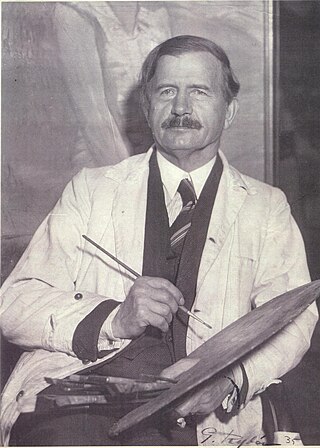
David August Wallin was a Swedish artist. In 1932 he won an Olympic Gold Medal in the art competitions of the Olympic Games in Los Angeles for his oil painting "At the Seaside of Arild".

Konstskolan Idun Lovén is a preparative art school in Stockholm, Sweden. The school is named after the artist and former headmistress Idun Lovén.
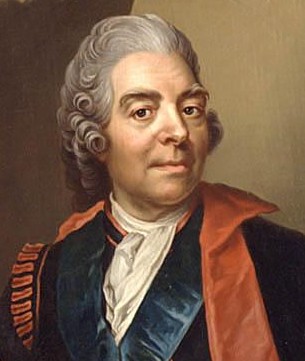
Gustaf Lundberg was a Swedish rococo pastelist and portrait painter. He trained and worked in Paris and later was appointed court portrait painter in Stockholm.

Hugo Birger was a Swedish painter.
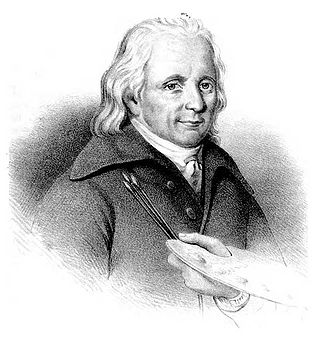
Elias Martin was a Swedish genre, history, and landscape painter and engraver from Stockholm. He is known for his watercolour paintings of Stockholm, and his landscape oil paintings that feature romantic lighting effects. Nationalencyklopedin describes him as Sweden's "first great landscape painter".

Carl Efraim Wallin was a Swedish-American artist and painting contractor. He was born in Östra Husby parish in the province of Östergötland, Sweden and died in Chicago, Illinois, United States.

Pehr Hörberg was a Swedish artist, painter and musician. In 1769 he married the maid Maria Eriksdotter and they had three sons.
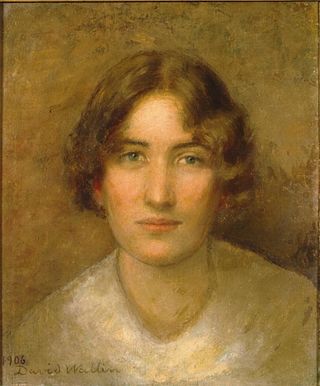
Elin Kristina Wallin was a Swedish artist and drawer. She was married to the Swedish artist David Wallin.

Gottfrid Larsson was a Swedish sculptor.

David Sigurd Wallin was a Swedish artist. He grew up in Stockholm.

Anna Sofia Palm de Rosa was a Swedish artist and landscape painter. In the 1890s she became one of Sweden's most popular painters with her watercolours of steamers and sailing ships and scenes of Stockholm. She also painted a memorable picture of a game of cards in Skagen's Brøndums Hotel while she spent a summer with the Skagen Painters. At the age of 36, Anna Palm left Sweden for good, spending the rest of her life in the south of Italy, where she married an infantry officer.
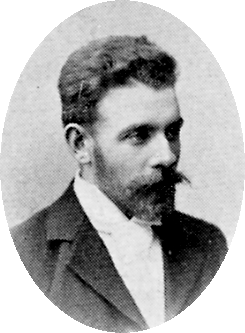
Alfred Maurits Bergström was a Swedish artist and art professor at the Royal Swedish Academy of Fine Arts who worked as a painter, watercolorist and etcher.

Ida Albertina Törnström, who wrote poetry under the pseudonym Sölve, was a Swedish writer, teacher and painter.

Mathilda Kristina (Kerstin) Cardon (1843–1924) was a Swedish painter and art teacher. One of the first 18 women to be admitted to the women's section of the Royal Swedish Academy of Fine Arts, she went on to produce portraits and still lifes in oils and pastels. In 1875, she began teaching at the Women's Teacher Training Seminary and opened her own painting school in central Stockholm. A popular high-society portrait painter, she produced three portraits of King Oscar II.